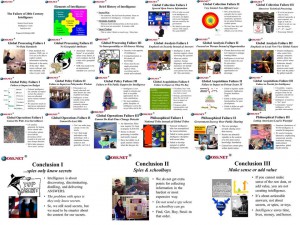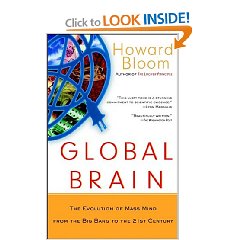The author's bottom line: not only must we come to grips with how power is managed in every nation and organization, but also we must manage at the *global* level if we are to succeed in optimizing fulfillment at the *individual* level.

The author's bottom line: not only must we come to grips with how power is managed in every nation and organization, but also we must manage at the *global* level if we are to succeed in optimizing fulfillment at the *individual* level.

New comment: Tom Atlee opened a door for me, and because of him I have joined the co-intelligence movement and will be publishing an edited work, COLLECTIVE INTELLIGENCE: Creating a Prosperous World at Peace, both free in PDF form at OSS.Net/CIB, and on Amazon from mid-February.
I see so many things starting to come together around the world and through books. The Internet has opened the door for a cross-fertilization of knowledge and emotion and concern across all boundaries such as the world has never seen before, and it has made possible a new form of structured collective intelligence such as H.G. Wells (World Brain (Adamantine Classics for the 21st Century)), Howard Bloom (Global Brain: The Evolution of Mass Mind from the Big Bang to the 21st Century), Pierre Levy (Collective Intelligence: Mankind's Emerging World in Cyberspace), Willis Harman (Global Mind Change: The New Age Revolution in the Way We Think), and I (The New Craft of Intelligence: Personal, Public, & Political–Citizen's Action Handbook for Fighting Terrorism, Genocide, Disease, Toxic Bombs, & Corruption), could never have imagined.
This book is better than all of ours, for the simple reason that it speaks directly to the possibilities of deliberative democracy through citizen study circles and wisdom councils.
The book is also helpful as a pointer to a number of web sites, all of them very immature at this point, but also emergent in a most constructive way–web sites focused on public issues, public agendas, new forms of democratic organization, and so on.
Still lacking–and I plan to encourage special organizations such as the Center for American Progress to implement something like this–is a central hub where a citizen can go, type in their zip code, and immediately be in touch with the following (as illustrated on page 133 of New Craft):
1) a weekly report on the state of any issue (disease, water, security, whatever);
2) distance learning on that issue;
3) an expert forum on that issue;
4) a virtual library on that issue including links to the deep web substance on that issue, not just to home pages of sponsoring organizations;
5) a global calendar of all events scheduled on that issue, including legislation and conferences or hearings;
6) a rolodex or who's who at every level for that issue;
7) a virtual budget showing what is being spent on that issue at every level; and
8) an active map showing the status of that issue in time and space terms, with links to people, documents, etcetera.
I cannot say enough good things about this book. If the authors cited above have been coming at the same challenge from a “top down” perspective, then Tom Atlee, the author of this book, gets credit for defining a “bottom up” approach that is sensible and implementable. This book focuses on what comes next, after everyone gets tired of just “meeting up” or “just blogging.” This book is about collective intelligence for the common good, and it is a very fine book.
Five other books (all I am allowed to link):
Leadership and the New Science: Discovering Order in a Chaotic World
Society's Breakthrough!: Releasing Essential Wisdom and Virtue in All the People
One from Many: VISA and the Rise of Chaordic Organization
The World Cafe: Shaping Our Futures Through Conversations That Matter
The Cultural Creatives: How 50 Million People Are Changing the World
Finally, the author deserves major credit for putting all this techno-marvel stuff into a deep sociological and cultural context. He carefully considers the major issues of privacy, control, social responsibility, and group behavior. He ends on very positive notes, but also notes that time is running out–we have to understand where all this is going, and begin to change how we invest and how we design everything from our clothing to our cities to our governments.
This is an affirming book–the people that pay taxes can still look forward to the day when they might take back control of their government and redirect benefits away from special interests and back toward the commonwealth. Smart mobs, indeed.


BRIEFING: 2002 Steele Failure of 20th Century Intelligence
Continue reading “2002 FAILURE of 20th Century Intelligence”

5 out of 5 Stars
Live and Let Die Group Dynamics, Bacteria Are Winning
July 13, 2001
Very very few books actually need to be read word for word, beginning with the bibliography and ending with the footnotes. This is one of those books. While there are some giant leaps of faith and unexplained challenges to the author's central premises (e.g. after an entire chapter on why Athenian diversity was superior to Spartan selection, the catastophic loss of Athens to Sparta in 404 BC receives one sentence), this is a deep book whose detail requires careful absorbtion.
I like this book and recommend it to everyone concerned with day to day thinking and information operations. I like it because it off-sets the current fascination with the world-wide web and electronic connectivity, and provides a historical and biologically based foundation for thinking about what Kevin Kelly and Stuart Brand set forth in the 1970's through the 1990's: the rise of neo-biological civilization and the concepts of co-evolution.
There are a number of vital observations that are relevant to how we organize ourselves and how we treat diversity. Among these: